Fighting Ebola in Africa
by Zhang Yuwen
Lumley Beach in the capital city Freetown is one of Sierra Leone's best-known beaches but in August 2014, it appeared deserted. The invigorating sea breeze was there, so were the swaying coconut trees and the blue Atlantic Ocean, but there were no people.
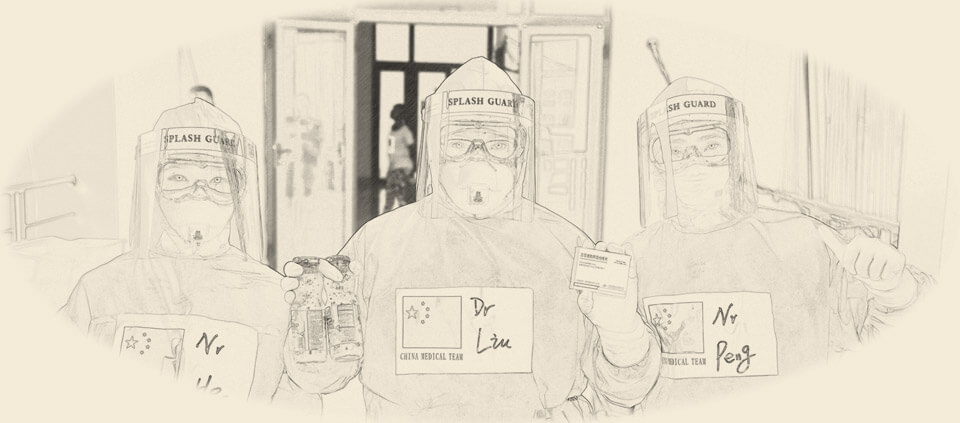
The hotels on the beach were closed and only one restaurant was open. There were few people inside, all of them locals with no sign of tourists. Two of them were anxiously discussing the prospects of leaving the area.
"You won't be able to buy a plane ticket," one of them said. "People are trying to get out of this place, and airlines are cancelling flights. The whole world is terrified of the deadly Ebola!"
One of them looked at the TV in the room and nudged his companion. "Look, the WHO is making a statement," he said.
On the screen, Dr. Margaret Chan, then Director General of WHO, was making an appeal. She said the Ebola epidemic spreading in parts of western Africa was the largest, most complex and most severe epidemic in nearly 40 years. The number of patients was growing rapidly and had exceeded the capacity of the local health system. Dr. Chan said international assistance was badly needed, especially doctors, nurses, medical supplies and relief materials, to cope with the situation.
Even as she was speaking, the first medical assistance team for West Africa was being assembled in China.
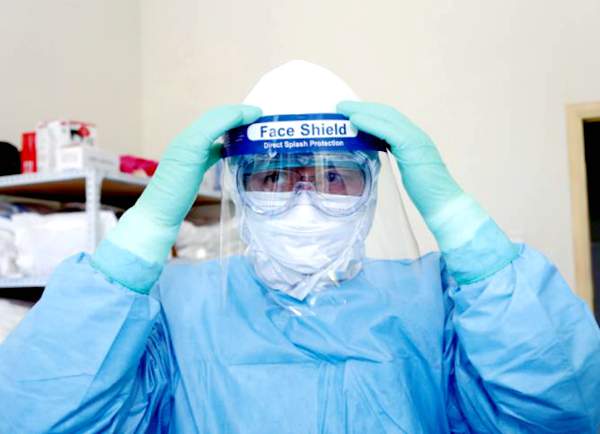
A member of the Chinese medical team
Saving the Lion Mountains
Sierra Leone means Lion Mountains, derived from Portuguese words. However, the Lion Mountains, known for their scenic beauty, looked devastated.
The Ebola Virus Disease, a deadly disease with a mortality rate of 90 percent, began to wreak havoc along the coast of West Africa – in Sierra Leone, Guinea, Liberia and other countries in the spring of 2014. The fatal virus spread through contact with the body fluids, such as blood, and the respiratory tracts of infected persons, with near fatality among patients.
Sierra Leone suffered the worst outbreak, with the fastest rise in the number of infections. Over half the population had been living in poverty and the average life expectancy was below 50 years before Ebola and the epidemic worsened the situation. In one village of 40 people, for example, 39 died of Ebola.
The fragile local medical system almost crumbled. The over 6 million people in the country had no more than 200 doctors and as medical workers caught the infection, only about half of them were reporting for work. Of the 10 ambulances, two had to be scrapped, medical protection supplies were almost exhausted, and some hospitals ran out of gloves and needles.
At this critical moment, China sent medical teams to Sierra Leone in five batches. Shouldering its international responsibility as a major country, China rushed health and other emergency materials to the countries affected. Nearly 1,200 medical personnel and public health experts from China carried out Ebola tests, diagnosis and treatment as well as personnel training in West Africa. They also provided crucial technical guidance.
Among the international medical teams from more than 20 countries, the Chinese teams received the most patients daily and reported the highest cure rate. Also, all team members reported zero infection.
It was therefore no wonder that when Africa composed a special song, Eradicating Ebola, the lyrics had a line that said, "Many have left because of Ebola, but China has come to our aid!"
For a Better Future
In Changsha, the capital of Hunan Province in central China, it was May, when the days are hot but the evenings turn cool. Deng Guiyuan, deputy head nurse of the Department of Cardiology at Xiangya Hospital, was packing her bags with an eye on the news on TV. She would be leaving for Sierra Leone the next day.
"According to the statistics released by WHO, as of April 5, a total of 25,515 suspected and confirmed Ebola cases have been found in Sierra Leone, Liberia and Guinea, the main Ebola-affected countries, and 10,572 deaths have been reported," the news reader announced. "At the request of West African countries and the WHO, China will send the fifth batch of its medical teams to epidemicravaged Sierra Leone."
Images related to the epidemic in Africa appeared on screen – stretchers, people in masks, helpless women and children, and armed policemen maintaining public security.
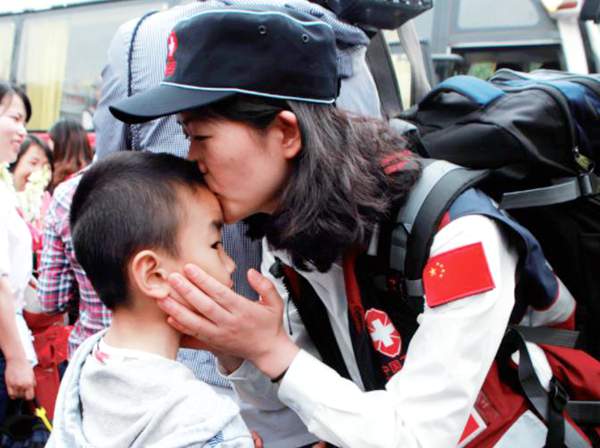
Deng Guiyuan, a member of the Chinese medical team bound for Sierra Leone, kisses her son goodbye before departure.
"Mom, aren't you going to Sierra Leone?" Deng's eight-year old son, who was watching the news on TV, asked her with great concern. "My classmates said the Ebola is more horrible than war!"
"Your mom is a professional doctor. I will be absolutely safe. While I am away, you must study hard and listen to your dad." Deng patted him gently on his head and glanced at her silent husband. "Relax, I will be fine," she added.
When she was on the plane the next day, Deng kept thinking of the conversation she had with her son when he saw her off: "Mom, I haven't decided yet what to buy you for your birthday," he said.
"Haoran, I don't need anything," she told him. "I just want to help the children in Africa get better as soon as possible. I'll be very happy if they become as healthy as you!"
She felt close to tears. It was a tearful farewell for the other medical team members as well. While saying goodbye to their family, many were overcome by emotions. Later in Sierra Leone, they cried again while saying goodbye to the patients they cured.
In Sierra Leone, a young African woman and her daughter were admitted in the China-Sierra Leone Friendship Hospital. The woman had Ebola and died soon afterward. Her daughter, Karratha, was carefully examined by the Chinese doctors and found to be uninfected. They said she could be discharged after a few days of observation at the hospital.
During those days at the hospital, Karratha came to regard Liu Bing, a doctor on the Chinese medical team, as her foster mother. When she was finally discharged, Karratha was reluctant to leave and kept turning back and waving.
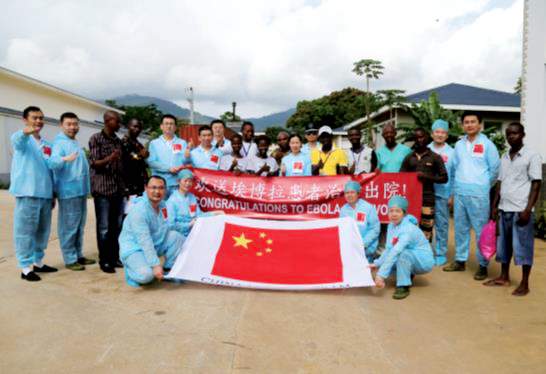
Medical staff pose for a group photo with cured Ebola patients before the latter are discharged from the hospital.
The parting made Liu Bing cry. "You are a lucky girl," she told Karratha. "Stay well and study hard. I hope you will visit China in the future and then we will meet again. All the best!"
Liu thought Karratha was lucky because not only did she escape getting infected but would also receive assistance from the UNICEF under the coordination of the medical team. Seeing the hopeful future ahead of the girl with better education, Liu Bing had a moment of profound understanding. She understood how the future of the world lies in the future of the children.
After saying goodbye to Karratha, the Chinese doctors took off their thick protective suits and came out of the ward in the dazzling African sunlight. It reflected their mood, sunny and upbeat.
The Battle Is Still On
It was difficult to diagnose Ebola quickly and because of this people who were not infected originally often became cross-infected due to lack of quarantine measures. It was difficult to track infected patients. In addition, a fragile health system and Africa's funeral customs, where mourners gather together, were factors that accelerated the spread of the disease. In Sierra Leone Ebola originated in cities, and the large-scale flow of people caused the epidemic to spread rapidly.
In the face of such a deadly virus, in addition to patients' family members, relatives and friends, the medical staff treating them became another group of people highly susceptible to getting infected. Despite the danger in the time of crisis they fought the arch enemy with courage and perseverance, showing commendable professional ethics and moral values.
When Mu Jinsong, the leader of a Chinese medical team, met George, the director of a provincial hospital in Sierra Leone with a high reputation in the country's medical community, he found George alarmingly weak. The director couldn't even stand up. Before the arrival of the Chinese doctors, he had been leading the few doctors and nurses in the hospital to do their best to treat the incoming patients whose number was increasing rapidly.
Mu's professional instinct gave him a sense of foreboding and he asked to be allowed to examine the Sierra Leonean. In the examination room, George, though in pain, mustered the strength to describe his symptoms in precise medical terms. The hospice care ward seemed more like a meeting room for doctors to discuss a patient's condition.
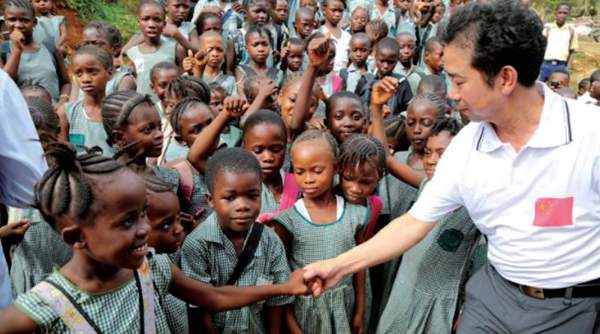
China-Africa friendship is passed down from generation to generation.
Listening to George, Mu's face darkened. It seemed to him that George had not only been infected with Ebola but was in the terminal stage of the disease, suffering from shock and multiple organ failures. But the director's eyes reflected his internal strength.
Mu realized that it was impossible that George, as a doctor, did not know that he was approaching the end of his life, and he was moved by the dying man's stoicism. The medical team tried their best to treat George during his last five days but eventually, he was gone.
Looking at his empty bed in the hospital, the medical team went through a medley of emotions. Besides sorrow, it was also a reminder of their own mortality. The hospital had prepared 15 beds for them as well. If they became infected with the virus, like George, these beds would be their final destination.
However, no one flinched and their work continued. The rising incidence of patient deaths and cross-infections that forced the African doctors to leave their posts brought it home to the medical team that prevention had to be the top priority in the anti-epidemic work.
However, there was a shortage of medical personnel in Sierra Leone, and the temporary medical personnel and cleaning staff had no knowledge of epidemic prevention. This increased the risk of infections.
So they began training the local medical workers. Zorani, one of the nurses trained on the job, said she had never seen such strict protection requirements before. Under the constant emphasis of the Chinese medical team, she learned to follow the 36 steps involved in putting on and taking off 11 protective gear items in the high temperature of Sierra Leone.
As the local medical workers in Sierra Leone had never followed such a complicated self-protection process before, it often took them more than an hour to put on their protective suits, something experienced medical workers could do in less than 20 minutes. While they wore their protective suits, they could not go to the toilet or even drink water. Every time they took off the suits, sweat poured out. But it was precisely because of those extra 50 minutes they spent that many lives were saved.
"Fortunately, we followed these procedures strictly. Otherwise we might have died of Ebola," Zorani said.
Thanks to the strict protective measures followed by the Chinese medical team, none of them were infected. Medical teams from the United States, the United Kingdom and Canada came several times to observe and study their protective procedure and some overhauled their own standards. The idea that "the steps in taking off protective suits are more important than those putting on them" has been generally accepted by the international medical community.
Director Kanu of the China-Sierra Leone Friendship Hospital said he was indebted to the Chinese medical team. "I am very grateful to the Chinese medical team. Before they came, our country had no experience and no knowledge in this field. After they arrived, they trained us and we learned how to battle the epidemic," he said. "China has created an infectious disease prevention and control team for Sierra Leone forever."
In addition to training a local professional team for Sierra Leone, Chinese scientists also developed an Ebola vaccine. In October 2017, China became the third country after the United States and Russia to develop a successful Ebola vaccine.
The liquid vaccines developed by the other countries need stringent cold chain preservation while in contrast, the freeze-dried powder Ebola vaccine developed by China can be stored at room temperature and has a longer shelf life, and is therefore more suited for wide use on the African continent. The availability of such a compatible vaccine has helped Africans overcome their panic over Ebola.
"When Sierra Leone was hit by the Ebola epidemic and was at its most vulnerable stage, the Chinese government took the lead in the international community in helping us," Sierra Leone President Ernest Bai Koroma said in December 2016 when he visited China. "We are grateful to the Chinese government for providing selfless support when we were hit by the Ebola epidemic."
Since the inception of human history, the battle between humans and diseases has never stopped. To this day, Ebola has not been eradicated. However, while grappling with the disaster, Sierra Leone did not succumb to it, nor did its people. The Chinese doctors did not leave when the epidemic was raging and the assistance from China did not stop. The medical workers of the two countries have built a defense line to save lives, upholding life and the global community of shared future.
FOR MORE
Project Overview:
In 2014, the Ebola epidemic broke out in many countries in West Africa. China was the first in the international community to provide multiple rounds of emergency assistance, which constituted the largest and longest emergency humanitarian relief and medical aid operation in China's history.
By the first half of 2015, China had provided four rounds of emergency humanitarian assistance worth about RMB750 million (USD105.98 million) in total, and initiated the fifth round of cooperation in post-Ebola recovery, helping in reconstruction of the countries affected and building a future-oriented public health system.
In terms of personnel and capacity building, nearly 1,200 medical personnel were sent in batches to carry out tests, diagnosis, treatment, training, technical guidance and other prevention work.
In terms of facilities, China sent an advanced mobile biosafety laboratory to Sierra Leone, and helped build the first fixed biosafety level-3 laboratory in West Africa. It transformed the China-Sierra Leone Friendship Hospital into an in-patient medical center for patients with infectious diseases. It also built in just a month a 100-bed modern infectious disease diagnosis and treatment center in Liberia, which is the best of its kind in the country.


